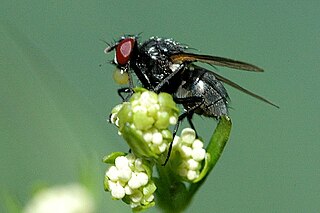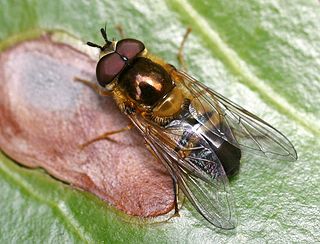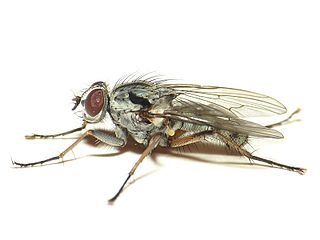
The Drosophilidae are a diverse, cosmopolitan family of flies, which includes species called fruit flies, although they are more accurately referred to as vinegar or pomace flies. Another distantly related family of flies, Tephritidae, are true fruit flies because they are frugivorous, and include apple maggot flies and many pests. The best known species of the Drosophilidae is Drosophila melanogaster, within the genus Drosophila, also called the "fruit fly." Drosophila melanogaster is used extensively for studies concerning genetics, development, physiology, ecology and behaviour. Many fundamental biological mechanisms were discovered first in D. melanogaster. The fruit fly is mostly composed of post-mitotic cells, has a very short lifespan, and shows gradual aging. As in other species, temperature influences the life history of the animal. Several genes have been identified that can be manipulated to extend the lifespan of these insects. Additionally, Drosophila subobscura, also within the genus Drosophila, has been reputed as a model organism for evolutionary-biological studies, along with D. sechellia for the evolution of host specialization on the toxic noni fruit and Scaptomyza flava for the evolution of herbivory and specialist on toxic mustard leaves.

Carl Fredrik Fallén was a Swedish botanist and entomologist.

A leaf miner is any one of numerous species of insects in which the larval stage lives in, and eats, the leaf tissue of plants. The vast majority of leaf-mining insects are moths (Lepidoptera), sawflies, and flies (Diptera). Some beetles also exhibit this behavior.

Dolichopodidae, the long-legged flies, are a large, cosmopolitan family of true flies with more than 7,000 described species in about 230 genera. The genus Dolichopus is the most speciose, with some 600 species.

Opomyzidae is a family of acalyptrate Diptera. They are generally small, slender, yellow, brown or black coloured flies. The larval food plants are grasses, including cereal crops, the adults are mainly found in open habitats. Some species being agricultural pests.

Hydrotaea is a genus of insects in the housefly family, Muscidae. They occur in most regions of the world but are more populous in warmer climates. They are often found on feces in summer months, and are therefore generally found in close proximity to livestock. Among the 130 known species in this genus, one of the most commonly recognized is the dump fly.

Epistrophe is a genus of flies in the family Syrphidae, the hoverflies or flower flies.

Hebecnema is a genus of true flies of the family Muscidae.
Diastata is a genus of flies, and are in the family Diastatidae.
Meoneura is a genus of carnid flies (Diptera).
Hydrophorinae is a subfamily of flies in the family Dolichopodidae. According to Germann et al. (2011), the subfamily is polyphyletic.

Chamaemyia is a genus of flies in the family Chamaemyiidae. It is the type genus of its family.

Eustalomyia is a genus of root-maggot flies in the family Anthomyiidae. There are about five described species in Eustalomyia.

Discomyza is a genus of shore flies in the family Ephydridae.
Bicellaria is a genus of flies belonging to the family Hybotidae.
Cnemacantha is a genus of flies belonging to the family Lauxaniidae.
Ephydrinae is a subfamily of shore flies in the family Ephydridae.










